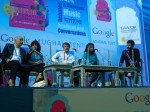The Edinburgh World Writers’ Conference returned to the DSC Jaipur Literature Festival today, as panellists from across the Arab world discussed the idea of nationalism in Arabic literature.
In a session titled ‘Maps of Love and Hate: Nationalism and Arab Literature’, Tahar Ben Jelloun, Selma Dabbagh and Reza Aslan joined Jonathan Shainin to discuss the presence of a national literature within the Arabic speaking world along with Ahdaf Soueif, who delivered a key note speech on the same topic this summer in Edinburgh.
The debate kicked off with Aslan arguing that it was writers who defined the Arab identity and not the nation state. “The literature of this region is a cradle of storytelling,” he said.
When asked if categorizing writers as ‘Arabic’ is useful or necessary, author of Out of It, Selma Dabbagh said, “Because I am so hybrid, every time I get snug in a category that I move towards, I inevitably get kicked out by the purists who will kick me out of it. So with some of the definitions of Arabic literature I just wouldn’t fit in at all.”
Similarly Tahar Ben Jelloun shared this resistance to a strict categorization as a Moroccan – French writer. “People ask me if I am an Arab writer or a French writer, particularly when I am crossing through customs. If I say I am a French author the Arabs are going to say “You traitor!” If I say I am an Arab writer, the French will say “How ungrateful!” So that is a terrible dilemma and I prefer to answer that my homeland is my language, and you are allowed to have several homelands,” said Jelloun.
When asked if there are common themes that unite Arab literature, Soueif highlighted the shadow of colonialism as being present in contemporary fiction. “The great common experience is the experience of colonialism, as well as the fight for liberation and of what form the fight will take. That is a major theme in the Arab novel to a certain point, and then if we look at the novels of the 1980s and 1990s, they tend to explore the social issues of the day, and what direction these societies want to go in. However it is not very useful to isolate themes and say they are particular to Arab writing. Take a novel like George Elliot’s Middlemarch. Now, that could be an Arab novel, in the sense of the themes that it deals with, or The Mill on the Floss, it is just the local details that are different,” said Soueif.
The discussion then moved on to the idea of an author writing on a topic from the outside, peering in with an external gaze. “You always write from the exterior. A writer will always live in exile, even when he is home,” said Tahar Ben Jalloun, pointing to a tension between the individual and the collective, which he argued was characteristic of Arab literature. “I wanted to explain why the Arab tradition is poetic. Why did the Arab writers only arrive to novels recently within the last century? Zayab was the first Arab novel was only published in Egypt in 1912, because Arab society did not recognise the individual, so you recognise the clan or the tribe. Therefore it is very difficulty to put forward the one character of a novel,” he said.
During the audience debate Jelloun responded to an audience question of whether or not you can write in the language of your oppressor, with a particular nod to Palestinian writers who write in Hebrew. He said, “You can write in any language, including that of the oppressor. Emile Habibi was a great Palestinian writer who wrote in Hebrew and in fact brought humour to his work through a Yiddish charm.”
The hour-long session finished on an optimistic note with Soueif stating that after the Arab Spring writers have created their own freedom, “If you look at Arab literature you will not find literature that is written in imprisonment. It is free and will get freer.”

